Between at least April 2005 to May 2021, the Board’s website frequently explained how the scopes of practice worked. In April 2005, the Board explained that psychologists holding a vocational scope are also deemed to hold the general scope, and that “vocational scopes do not limit practice – competency does”. In May 2005 the website changed a bit but said the same thing. From September 2012 to some time in 2014, the Board explained clearly that a vocational scope does not ‘fence off’ any exclusive territory (other than title use) and that any psychologist can perform any activity as long as they competent to do so or are doing so under supervision. Vocational scopes simply provided practitioners the right to use the scope’s title, thereby signifying their competence to the public. A revised version to the same effect appeared on the website from January 2015-January 2018. In February 2018 it had been removed but in March 2018 a watered-down version to the same effect reappeared and stayed there until at least March 2019. From April 2019 to at least May 2021 that statement had been simplified.
More...
April 2005
As at April 2005, the website said this:
“A Note of Clarification: Psychologists who hold a vocational scope of practice are also deemed to hold the general scope. They can ethically practice in any area of psychology in which they are competent to practice. Vocational scopes do not limit practice – competency does. Vocational scopes assure members of the public that a practitioner has attained and maintains certain competencies.”
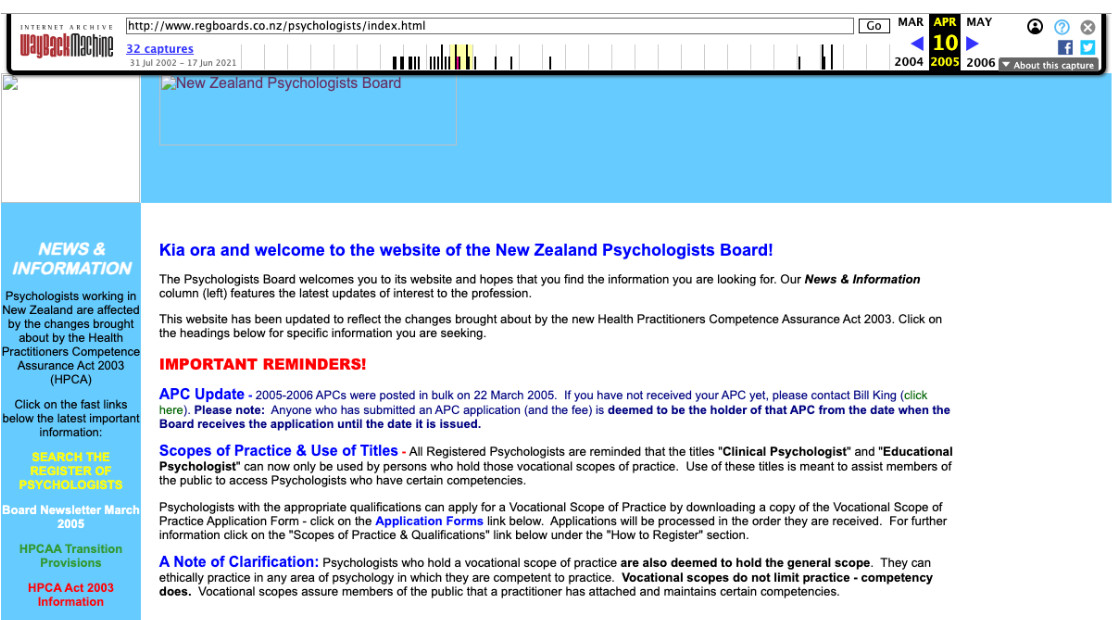
May 2005
In May 2005, the website had changed a bit but said the same thing:
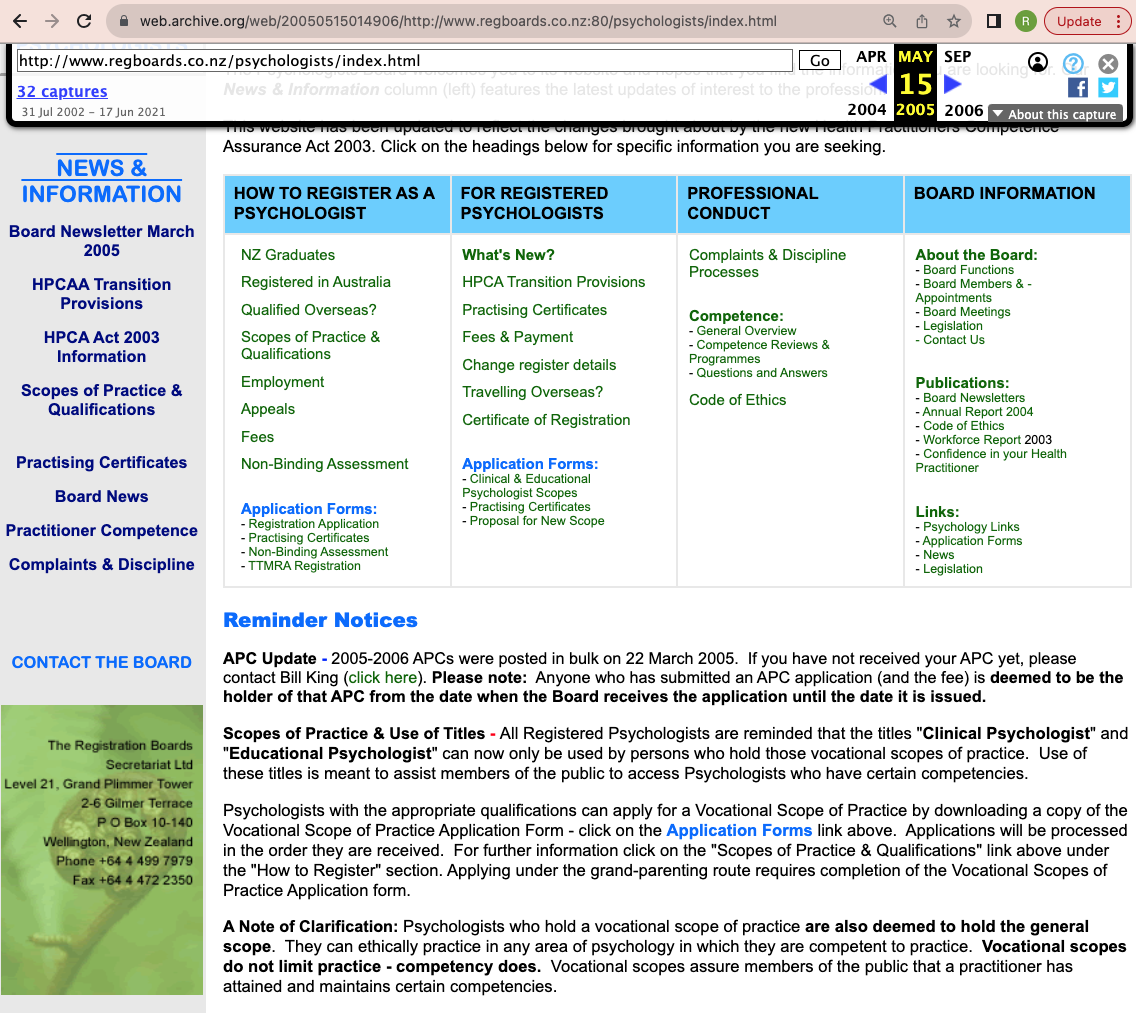
September 2012 through to some time in 2014
In September 2012, the website stated:
Important Clarification re Scopes of Practice
The Board has heard from psychologists and employers that vocational scopes are being used in ways that were never intended. Some employers and funders insist that psychologists hold a given scope as a condition of employment. While that is certainly any employer’s prerogative, it is important that all parties understand the following;
A vocational scope of practice does not “fence off” any exclusive territory (other than title use). Any psychologist can perform any activity, as long as they are demonstrably competent to do so, or are doing so under appropriate supervision (for example when training in a new area of practice). A vocational scope simply provides the practitioner with the right to use the scope’s title, and thereby clearly and simply signal to the public (or an employer) their competence in that scope.
In short, practice is not restricted by scope, but by competence. Only title use is restricted by scope.
All psychologists are ethically and legally bound to practise only within the bounds of their competence. Some employers and funders seem to assume that psychologists must have a specific vocational scope in order to competently provide the required service. Given the above clarification this can be seen to be untrue. For example, many highly competent and experienced practitioners working in the Family Court do not qualify for the Clinical Psychologist scope, but it would be a huge loss to the Court and to the families involved if these experts were denied work on that basis.
The Board has brought this clarification to the attention of major employers to ensure that the public continue to have good access to a range of experienced and competent psychologists.
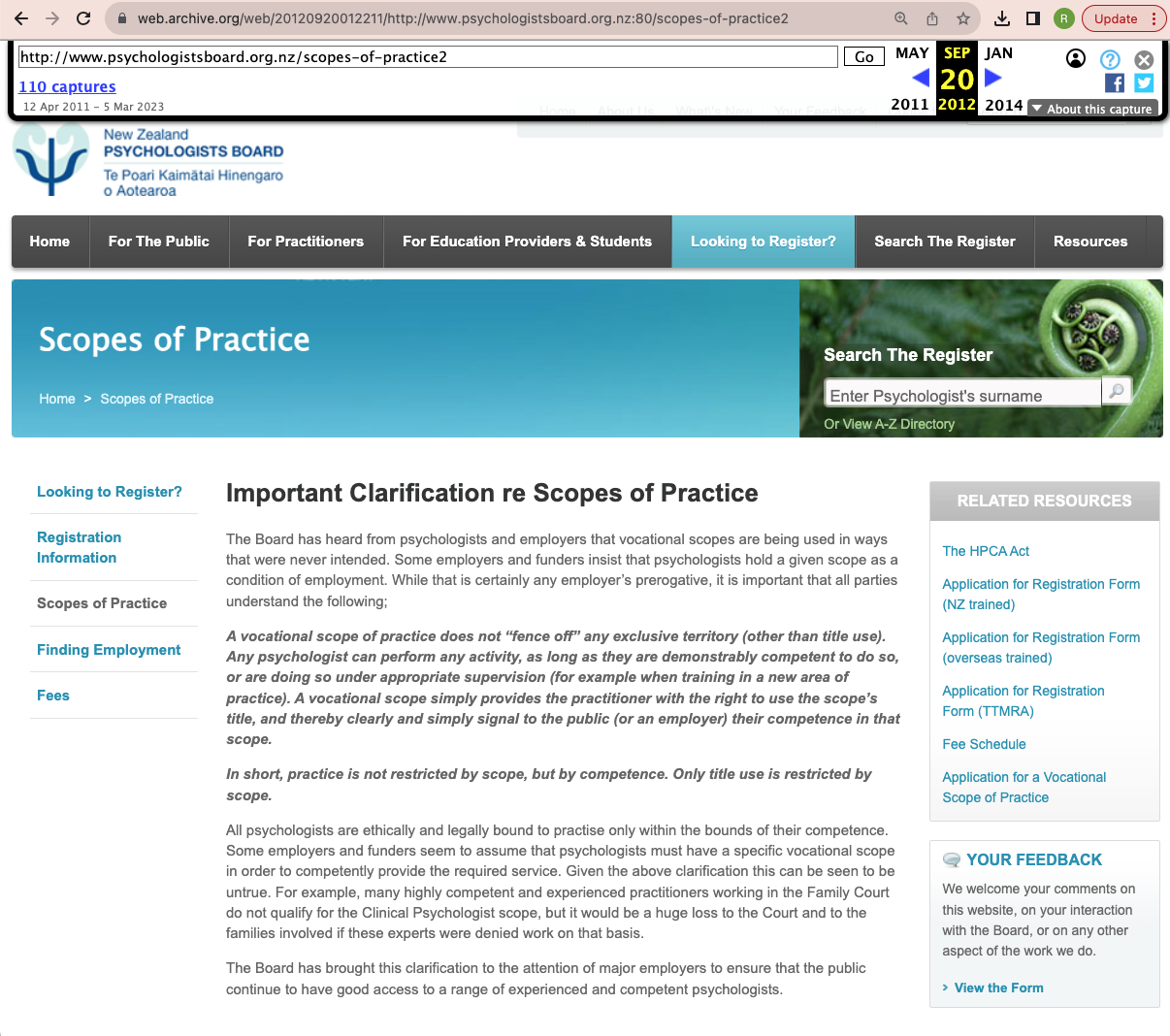
The statement above remained on the Board’s website until at least June 2014:
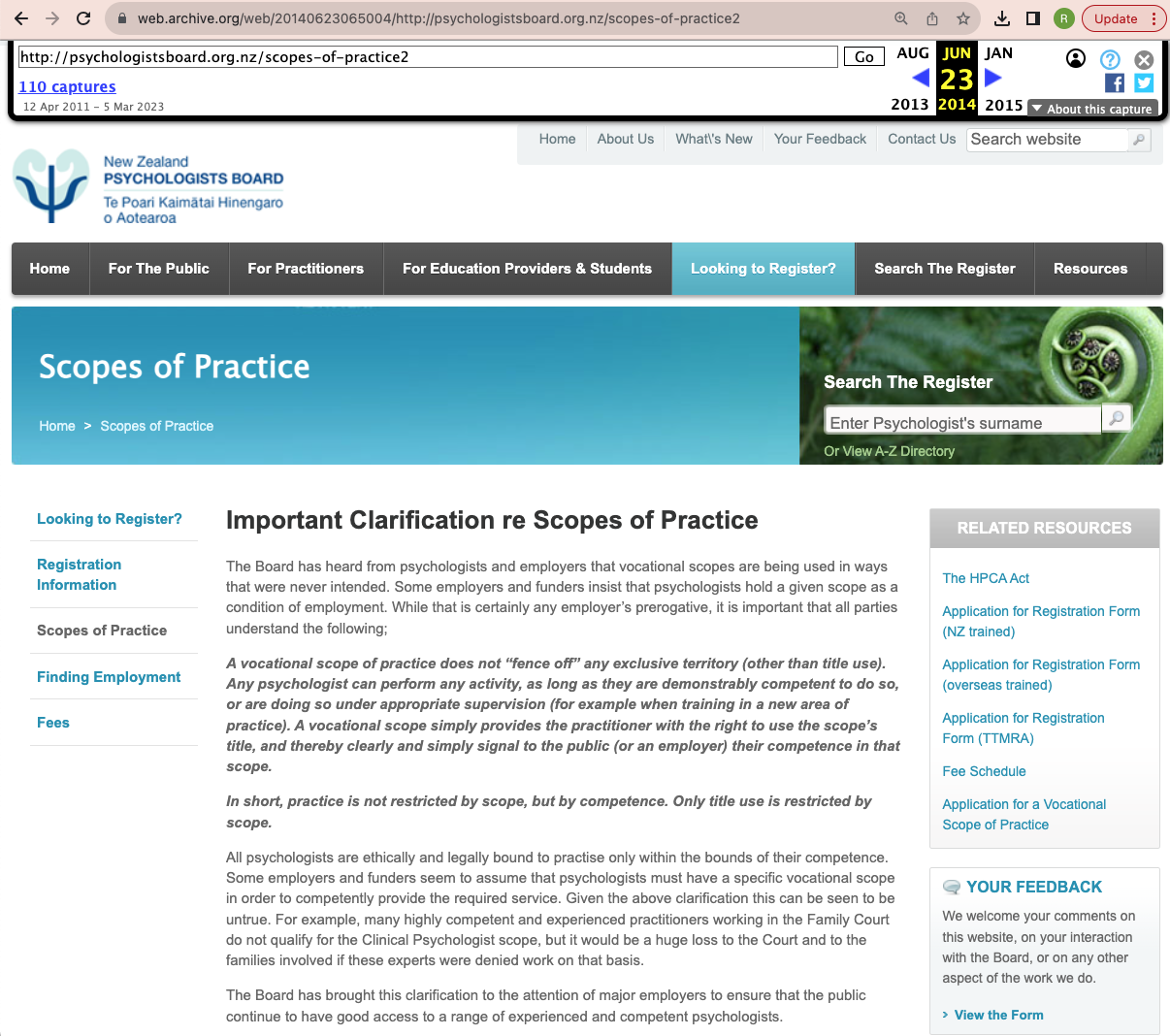
January 2015-January 2018
By 13 January 2015, the statement had been updated to read as follows:
Important Clarification re Scopes of Practice
The Board has heard from psychologists and employers that vocational scopes are being used in ways that were never intended. Some employers and funders insist that psychologists hold a given scope as a condition of employment. While that is certainly any employer’s prerogative, it is important that all parties understand the following;
A vocational scope of practice does not “fence off” any area of practice. It only protects use of the scope’s title.
A psychologist can perform any activity within the all-encompassing (“Psychologist”) scope of practice, as long as they are demonstrably competent to do so, or are doing so under appropriate supervision (for example when training in a new area of practice).
Holding a vocational scope simply provides the practitioner with the additional right to use that scope’s title, and thereby clearly and simply signal to the public (or an employer) their competence in that scope.
In short, practice is not restricted by scope, but by competence. Only title use is restricted by scope.
All psychologists are ethically and legally bound to practise only within the bounds of their competence. Some employers and funders seem to assume that psychologists must have a specific vocational scope in order to competently provide the required service. Given the above clarification this can be seen to be untrue. For example, many highly competent and experienced practitioners working in the Family Court do not qualify for the Clinical Psychologist scope, but it would be a huge loss to the Court and to the families involved if these experts were denied work on that basis.
The Board has brought this clarification to the attention of major employers to ensure that the public continue to have good access to a range of experienced and competent psychologists.
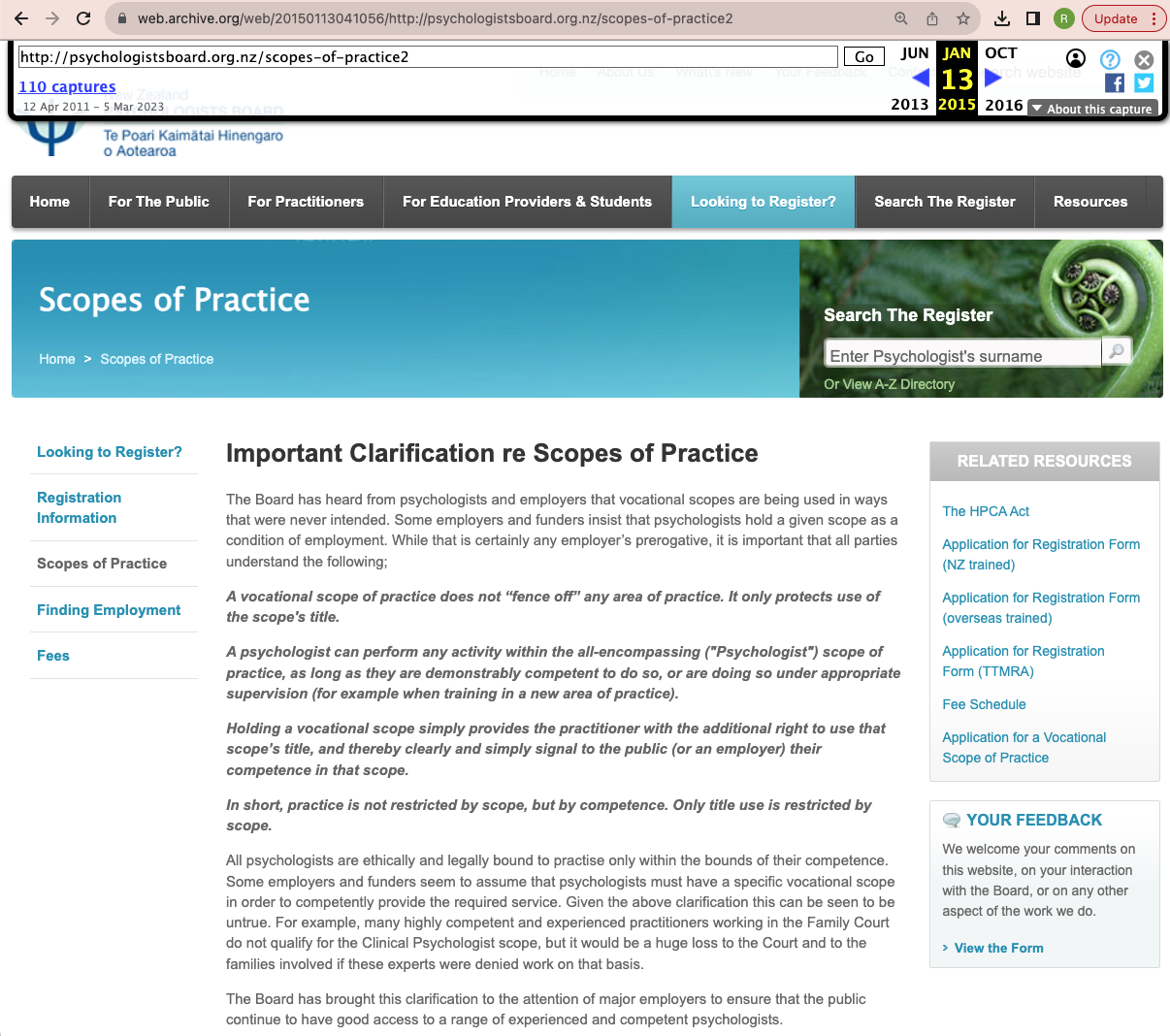
This remained on the Board’s website until at least January 2018.
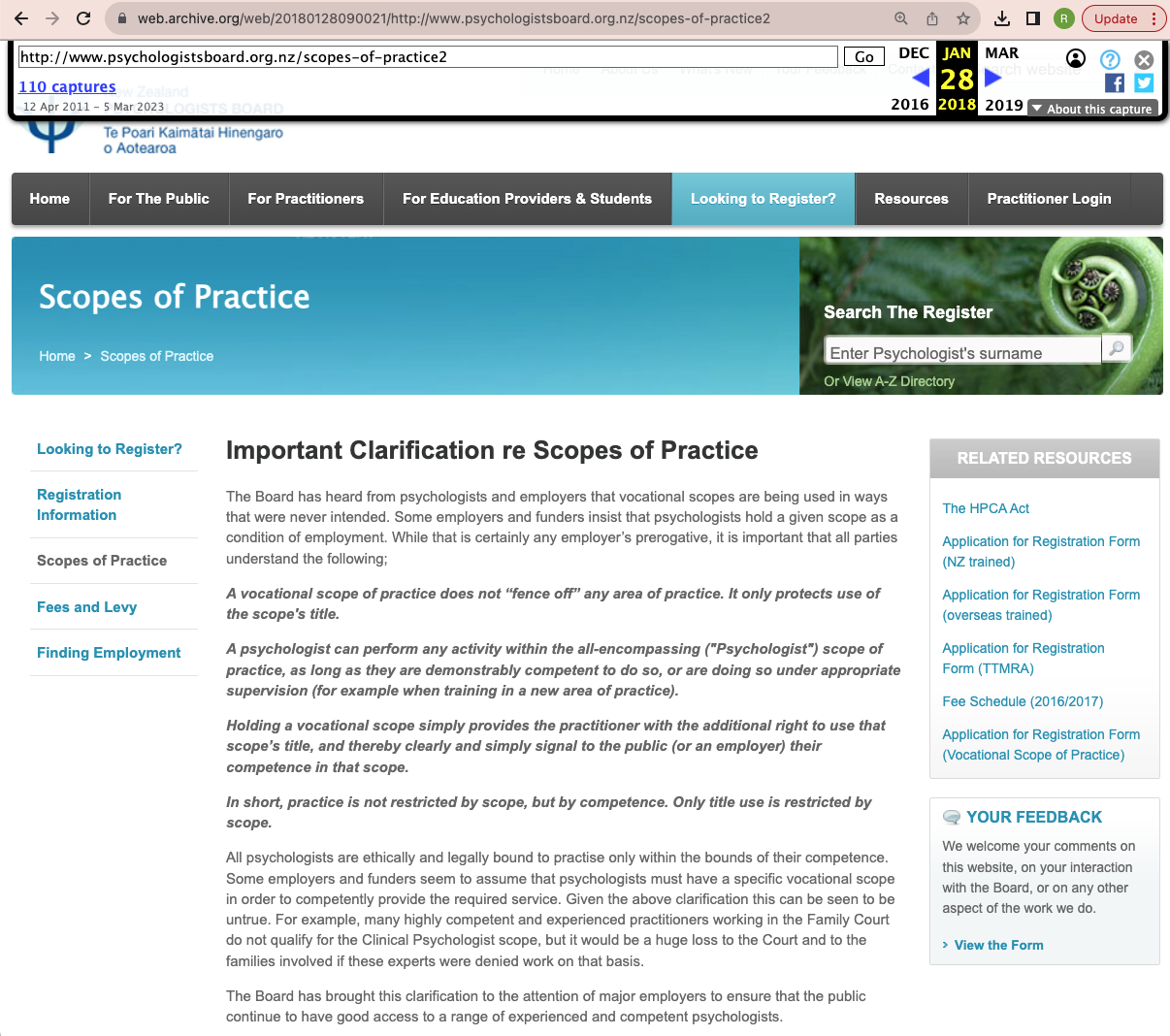
As at 3 February 2018, it had been removed:
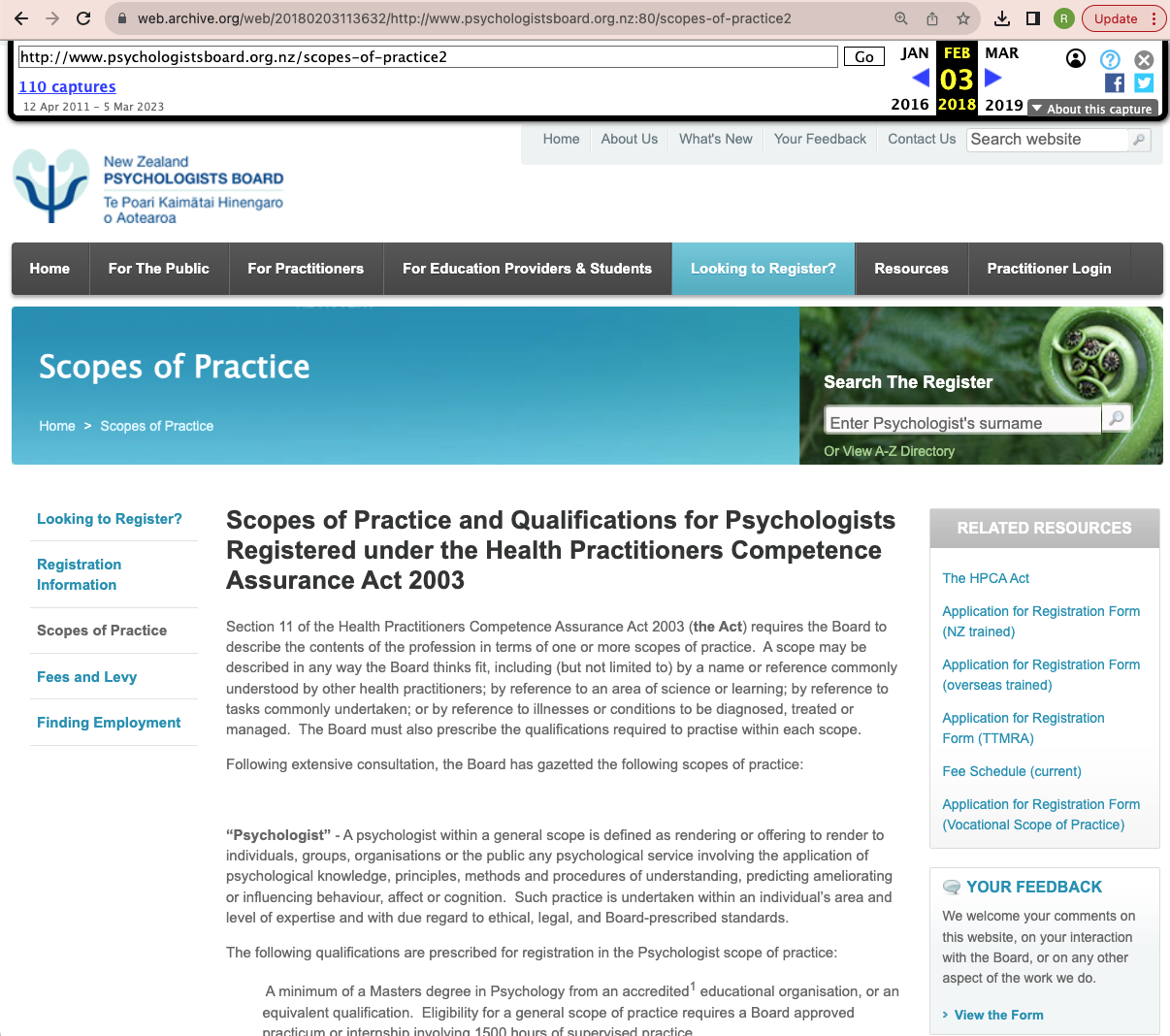
March 2018 to at least May 2019
In March 2018, the statement had reappeared but in watered-down form:
Important Clarification re Scopes of Practice
The Board has heard from psychologists and employers that vocational scopes are being used in ways that were never intended. Some employers and funders insist that psychologists hold a given scope as a condition of employment. While that is certainly any employer’s prerogative, it is important that all parties understand the following (updated 06/03/18);
Psychologists are ethically bound to practise within their scope of practice and in accordance with their area(s) and level of expertise.
A psychologist may work within a scope of practice, only if they are demonstrably competent to do so, or are doing so under appropriate supervision (for example when training in a new area of practice).
Holding a vocational scope provides the practitioner with the additional right to use that scope’s title, and signal to the public (or an employer) their competence in that scope. However, they must only work in those areas within a scope in which their education, training and experience has made them competent to work. If in doubt, they should seek supervision from a colleague with expertise in the area they are unsure about.
All psychologists are ethically and legally bound to practise only within the bounds of their competence, their scope of practice, and in accordance with their area(s) and level of expertise. Some employers and funders seem to assume that psychologists must have a specific vocational scope in order to competently provide the required service. Given the above clarification this can be seen to be untrue. For example, many highly competent and experienced practitioners working in the Family Court do not qualify for the Clinical Psychologist scope, but it would be a huge loss to the Court and to the families involved if these experts were denied work on that basis.
The Board has brought this clarification to the attention of major employers to ensure that the public continue to have good access to a range of experienced and competent psychologists.
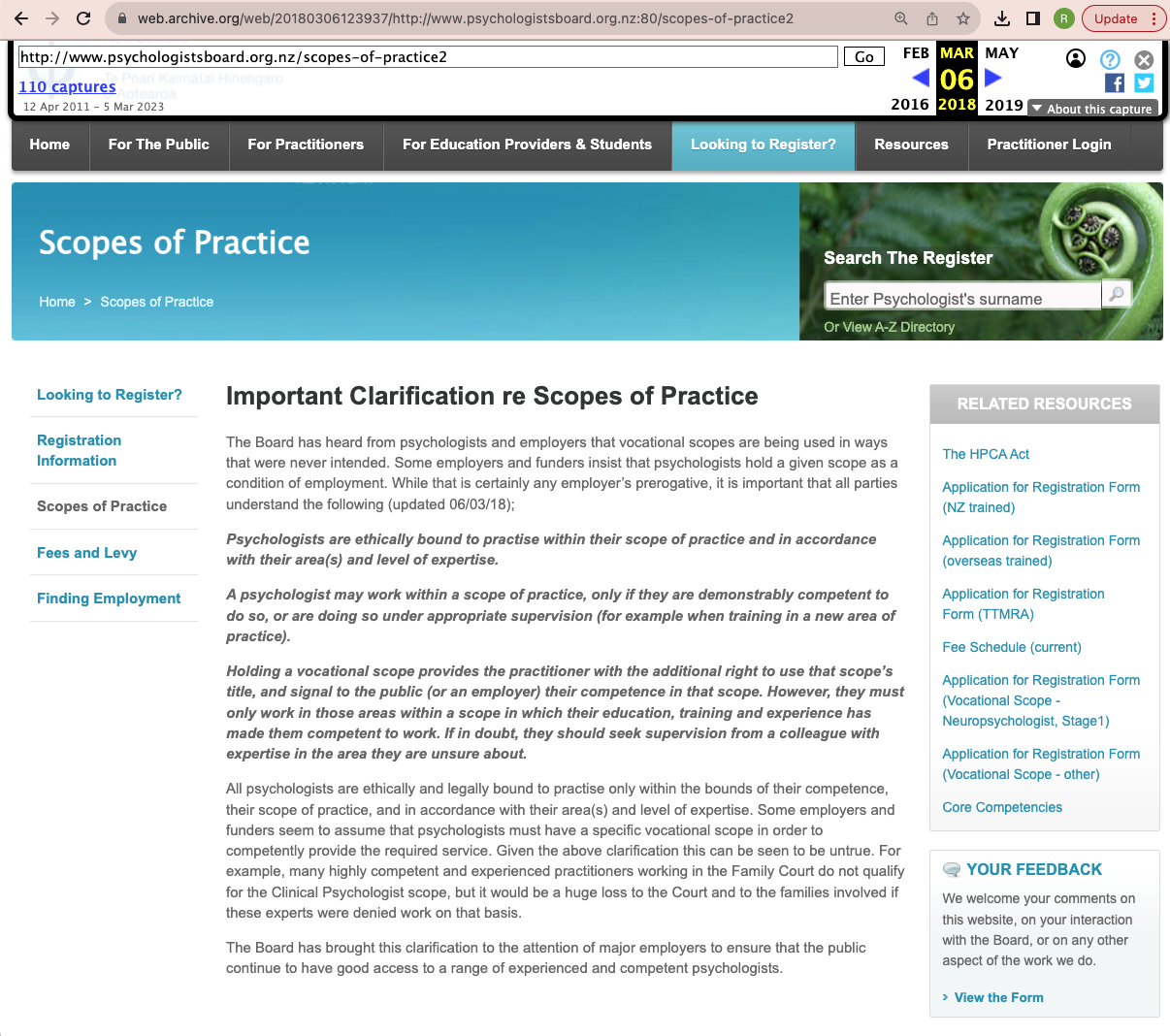
The changes in made in March 2018 did not affect the meaning of the previous messaging.
The statement remained like this until at least March 2019:
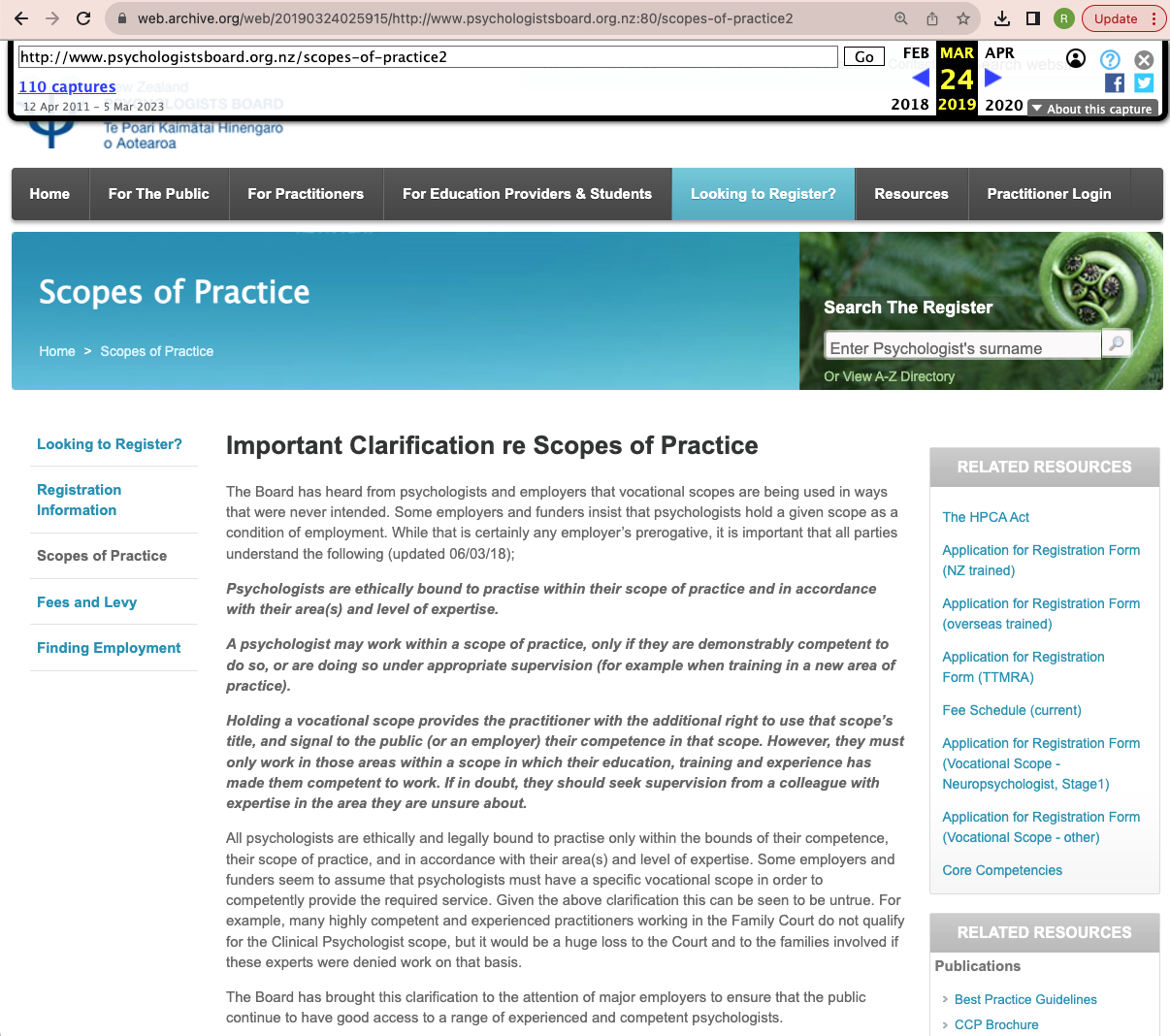
April 2019 to at least May 2021
By 24 April 2019, the statement had been simplified to read:
Scopes of Practice
Psychologists are ethically bound to practise within their scope of practice and in accordance with their area(s) and level of expertise.
A psychologist may work within a scope of practice, only if they are demonstrably competent to do so, or are doing so under appropriate supervision (for example when training in a new area of practice).
Holding a vocational scope provides the practitioner with the additional right to use that scope’s title, and signal to the public (or an employer) their competence in that scope. However, they must only work in those areas within a scope in which their education, training and experience has made them competent to work. If in doubt, they should seek supervision from a colleague with expertise in the area they are unsure about.
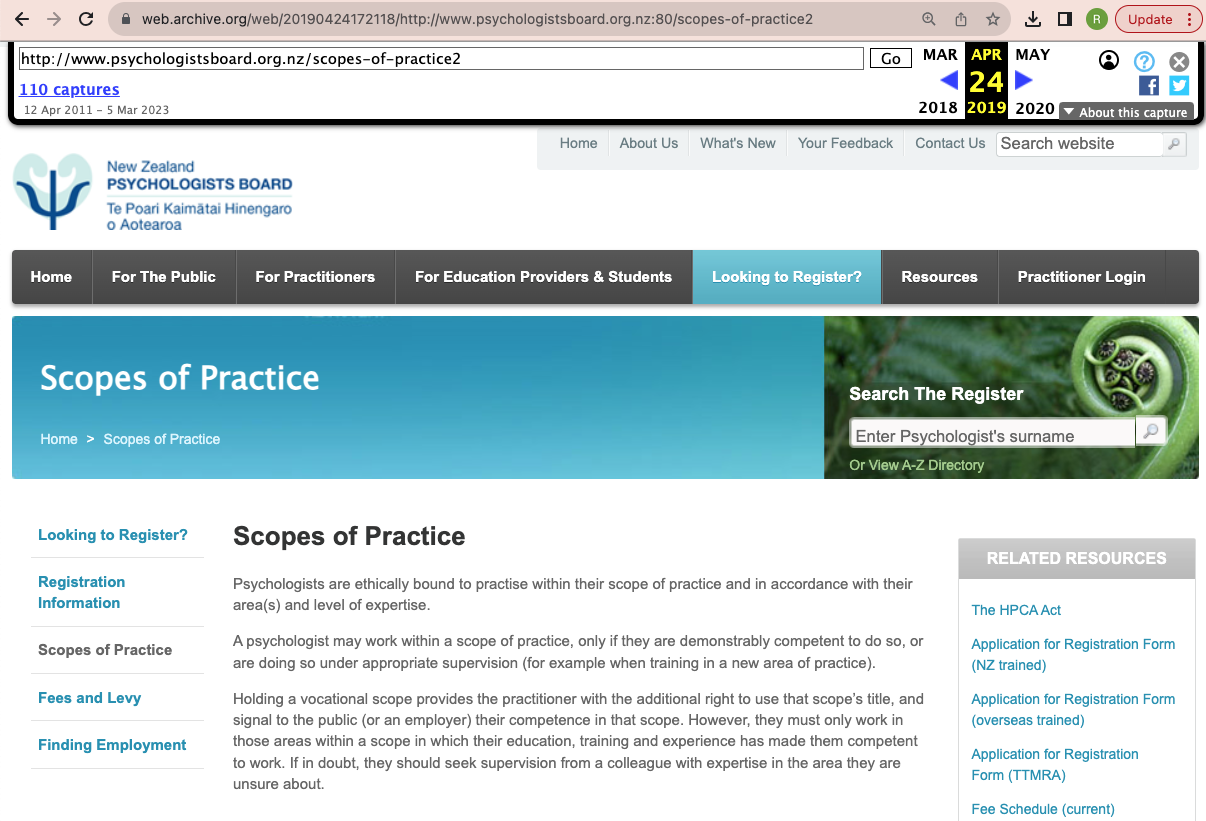
Bearing in mind the profession’s understanding of the all-encompassing general scope, this statement did not necessarily signal any change in the meaning of the previously more detailed statements.
The statement remained on the website until at least 6 May 2021:
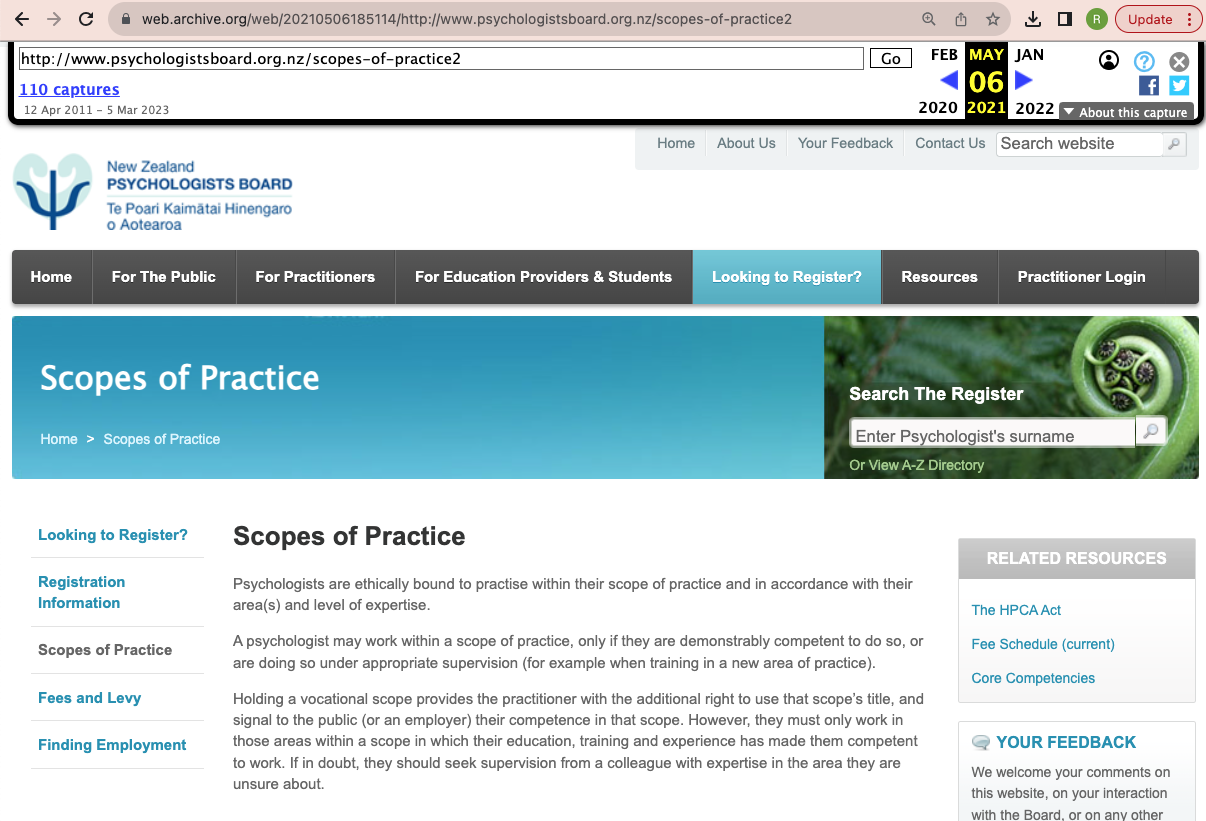
Some time after 6 May 2021, the page above appears to have been removed, perhaps when the Board updated its website.
Mid to late 2021 to November 2022
By 22 September 2021, the Board had changed its messaging on scopes:
Scopes of practice
Psychologists are ethically bound to practise within their scope of practice and in accordance with their area(s) and level of expertise
A psychologist may work within a scope of practice only if:
- they are registered in that particular scope of practice, AND
- they are demonstrably competent to do so, OR
- are doing so under appropriate supervision.
Within each scope of practice, a range of professional activities is encompassed. A practitioner is not permitted to practise in an area if they have not undertaken training and gained supervised experience to ensure that their practise is competent.
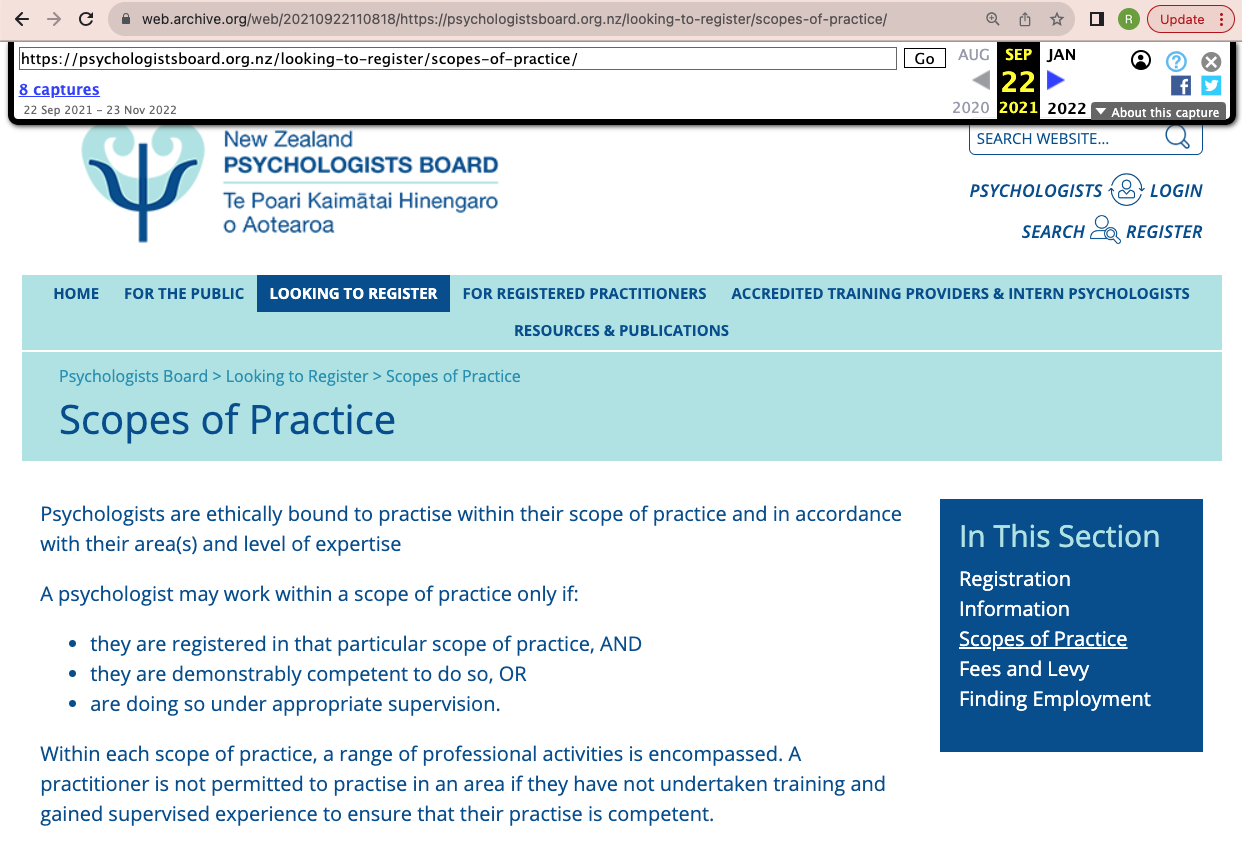
This statement remained on the website until at least November 2022.
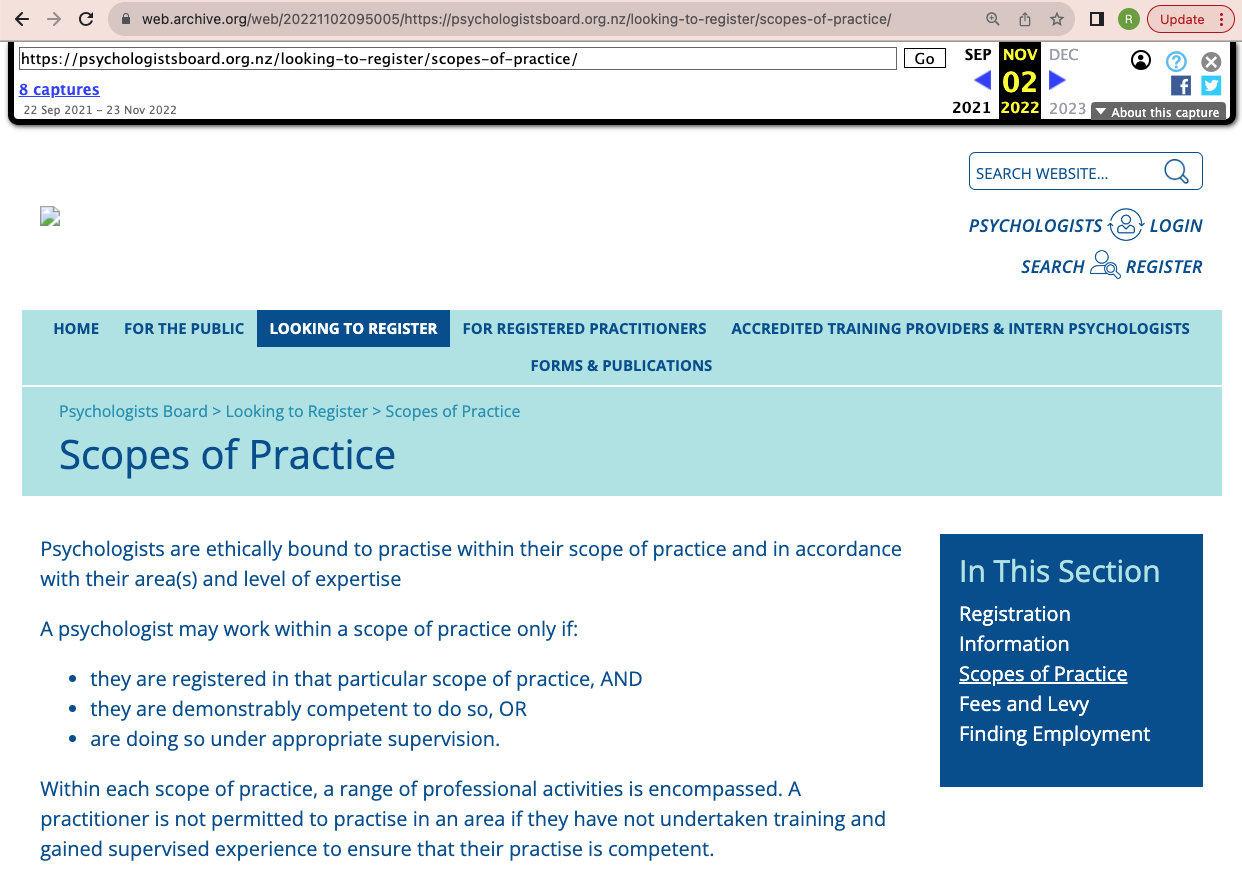
In December 2022, the Board’s website appears to have been hacked, and the site was down for a period.
2023
Some time in 2023, the Board updated what it says about scopes, as follows:
Scopes of Practice
Psychologists have a legal and ethical responsibility to practise only in areas in which they are suitably qualified and experienced. The Board has identified individual scopes that can be practised in New Zealand.
Each scope of practice for psychologists has a unique focus and requires specific qualifications and experience.
Please note: Section 8 of the Health Practitioners Competence Assurance Act 2003 states that health practitioners are not allowed to practise outside their scope of practice.
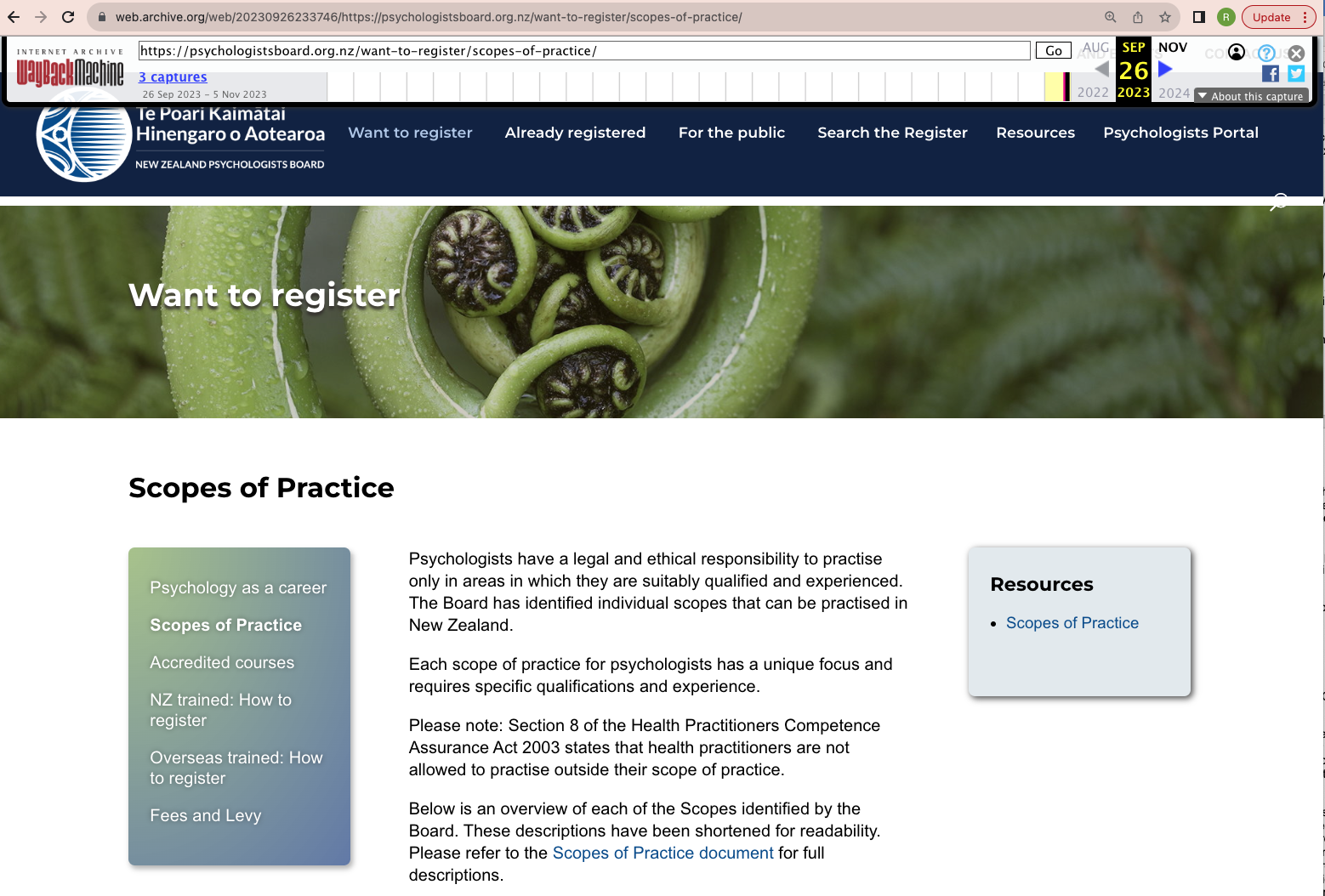
This wording effected a subtle but significant change. On its own, it may not have raised alarm bells. However, given what that the Board has been saying in recent months, including in the consultation paper, it is concerning. The statement that each scope ‘has a unique scope and requires specific qualifications’ is misleading if not wrong. For example, if it were correct, a psychologist with the ‘Clinical Psychologist’ scope would not be able to undertake any work covered by the ‘Neuropsychologist scope’. Similarly, a Clinical Psychologist ought not to be undertake work covered by the Educational Psychologist scope. It is very clear that that is not how the scopes were intended to apply.
